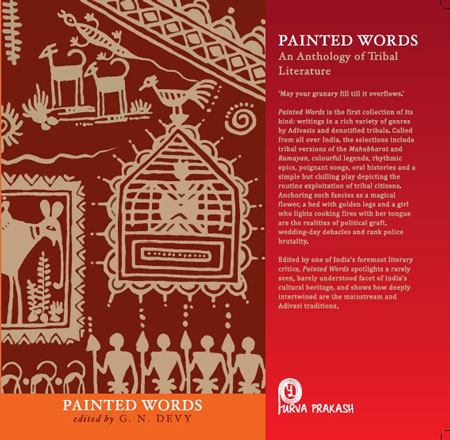communities that inhabit the tribal tracts of the
bordering districts of Jharkhand, West Bengal and Orissa [3:27]
Video © Ministry of Culture Govt. of India >>
Carved out of Bihar in 2000, many treasures of the relatively new state of Jharkhand situated in the Chota Nagpur Plateau is still less known to most people. Nature wears her best clothes in this state. Many rivers like the Damodar, Brahmani, Kharkai and the Subarnarekha, flow gently adding to the natural charm of Jharkhand. It is heaven on earth, where hill streams bubble like a young adivasi’s laughter. It is here that you can hear the sound of silence, taste the elegance of nature. The state is endowed with abundant mineral wealth, flora and fauna. The many tribes inhabiting this part of the country are scattered and spread all over the state. Jharkhand has proudly emerged culturally as an important multi ethnic state.
Over thirty indigenous communities exist harmoniously in Jharkhand. Some of the major tribes are the Santhals, Oraons, Mundas, Kharias, Hos and Cheros. Rich in culture and traditions, these communities have several colourful festivals. As the tribal communities gave up their gypsy life styles, they began clearing forests for settlements. The journey of their life is reflected in the rhythm of the different tribal and folk dances of the state.
Source: Easrern Zonal Cultural Centre
Address : http://ezccindia.org/jharkhand.html
Date Visited: Thu Aug 25 2011 23:38:48 GMT+0200 (CEST)
[Bold typeface added above for emphasis]
- Art forms documented by the Eastern Zonal Cultural Centre – Jharkhand
- Zonal Cultural Centres: List of “Component States” allocated to each centre – Government of India
Tips for using interactive maps
Toggle to normal view (from reader view) should the interactive map not be displayed by your tablet, smartphone or pc browser
For details and hyperlinks click on the rectangular button (left on the map’s header)
Scroll and click on one of the markers for information of special interest
Explore India’s tribal cultural heritage with the help of another interactive map >>
See also
Adverse inclusion | Casteism | Rural poverty
Childhood | Tribal Children’s Right to Education in India
Demographic Status of Scheduled Tribe Population of India (Census figures 2011)
Fact checking | Figures, census and other statistics
Human Rights Commission (posts) | www.nhrc.nic.in (Government of India)
Search tips | Names of tribal communities, regions and states of India
“What is the Forest Rights Act about?” – Campaign for Survival and Dignity
“Who are Scheduled Tribes?” – Government of India (National Commission for Scheduled Tribes, NCST)

Tribal Literature by G.N. Devy >>
Free eBooks & Magazine: Adivasi literature and languages >>
“India, a union of states, is a Sovereign, Secular, Democratic Republic with a Parliamentary system of Government. The President is the constitutional head of Executive of the Union. In the states, the Governor, as the representative of the President, is the head of Executive. The system of government in states closely resembles that of the Union. There are 28 states and 8 Union territories in the country. Union Territories are administered by the President through an Administrator appointed by him/her. From the largest to the smallest, each State/UT of India has a unique demography, history and culture, dress, festivals, language etc. This section introduces you to the various States/UTs in the Country and urges you to explore their magnificent uniqueness…” – KnowIndia (Government), States and Union Territories (Visited: 2 September 2023)
Learn more about India’s 28 States and 8 Union Territories – From Andhra Pradesh to West Bengal | Nutrition >>
See also
Chotanagpur | Chota Nagpur | Fact checking
Communities: Asur | Ho| Kharia | Munda | Oraon | Santal | State wise ST list (Scheduled Tribes)
Hul (Santal rebellion 1855-1856) | Tribal freedom fighters
Jharkhand | Jharkhand land rights
Video | Banam: Lutes and fiddles of the Santal people – Jharkhand and West Bengal
Video | Hul Sengel: The Spirit of the Santal Revolution (1855) – Jharkhand